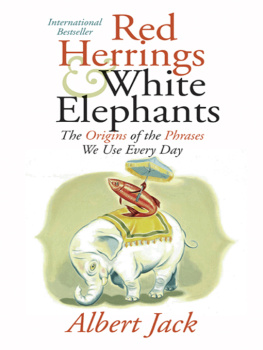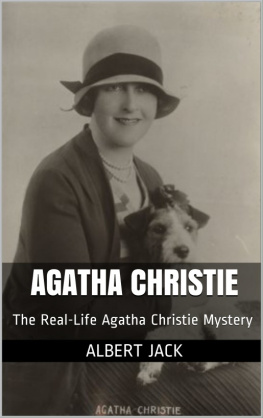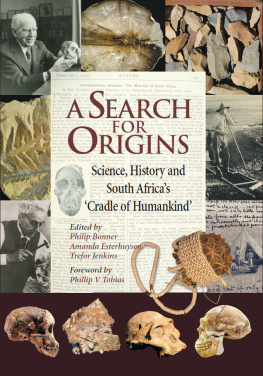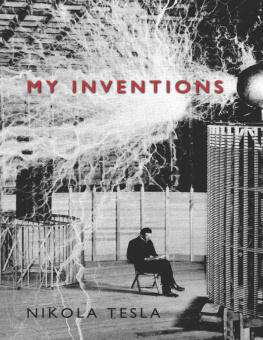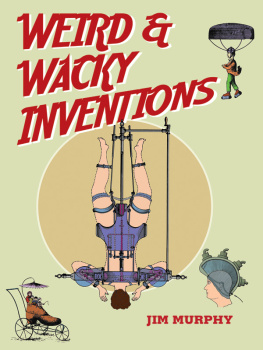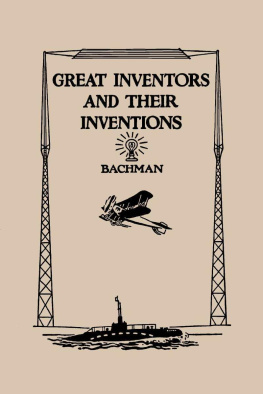Albert Jack is an English writer and historian who became something of a publishing phenomenon in 2004 when his first book Red Herrings and White Elephants , which explored the origins of well-known phrases in the English language, became a huge international bestseller. His other successful titles include Shaggy Dogs and Black Sheep, Phantom Hitchhikers, Loch Ness Monsters and Raining Frogs, Pop Goes the Weasel and What Caesar Did for My Salad .
First published in 2015 in the UK by Constable,
an imprint of Constable & Robinson Ltd
This edition published in 2015 by Skyhorse Publishing
Copyright Albert Jack, 2015
All rights reserved. No part of this book may be reproduced in any manner without the express written consent of the publisher, except in the case of brief excerpts in critical reviews or articles. All inquiries should be addressed to Skyhorse Publishing, 307 West 36th Street, 11th Floor, New York, NY 10018.
Skyhorse Publishing books may be purchased in bulk at special discounts for sales promotion, corporate gifts, fund-raising, or educational purposes. Special editions can also be created to specifications. For details, contact the Special Sales Department, Skyhorse Publishing, 307 West 36th Street, 11th Floor, New York, NY 10018 or .
Skyhorse and Skyhorse Publishing are registered trademarks of Skyhorse Publishing, Inc., a Delaware corporation.
Visit our website at www.skyhorsepublishing.com.
10 9 8 7 6 5 4 3 2 1
Library of Congress Cataloging-in-Publication Data is available on file.
Cover design by Rain Saukas
Cover illustration credit by Thinkstock
Print ISBN: 978-1-62914-758-1
Ebook ISBN: 978-1-63220-236-9
Printed and bound in the UK
This book is for Colin Willmott in Woking, England. He taught me to understand that anything is possible and never to believe you are not good enough to make a difference. I think that is what this book is all about (and perhaps my career).
Thanks Dad
ACKNOWLEDGEMENTS
I would like to thank Robert Smith and Hugh Barker for helping to bring this project together and the following team at Constable & Robinson for actually making it happen: Rod Green, Dominic Wakeford, Howard Watson and Clive Hebard.
Last, but who should be first, Geodey Weisner who, in conversation, unwittingly came up with the idea in the first place. If you dont like the book then it is his fault.
CONTENTS
INTRODUCTION
If the world should blow itself up, the last audible voice would be that of an expert saying, It cant be done.
Peter Ustinov
Curiosity will eventually lead to innovation. Fortunately we are an imaginative species that does a lot of wondering. Way back to when man first learned to walk upright and began communicating with each other, by pointing and shouting, we can find the earliest examples of this. Somebody once thought, I know, we can move that heavy rock, or dead buffalo, by rolling it along on tree trunks because it is easier than dragging it over the ground. This, of course, led to the wheel. It must have been around that time that some other clever soul worked out that if he held some meat over that hot firey thing then it tasted better. It seems basic but it was innovation. Somebody somewhere decided to take the risk of burning their food down into ashes, as they knew the burning logs did, just to see if it tasted any better. But I bet there was someone else laughing at him and saying, Dont do that, its a terrible idea (or whatever is was they would have said back then.) And thats innovation too. Thats discovery and invention.
We have been doing it ever since in one form or another and we have come a long way as a species thanks to people who take risks and ignore the advice of wiser ones. And that, in a nutshell, is what this book is all about. You see, for all of our innovations and invention over the last 6,000 years, it is incredible to understand that the one thing that has not changed at all is the human brain.
Believe it or not, the prehistoric human brain was perfectly capable of understanding how to use Windows 8.1 and could easily have landed a rocket on the moon if only the information it was given was better evolved at the time. The brain itself was already fine and all it needed was programming. That, of course, is what has happened to it over the many years since. Man has programmed its brain to learn new and better ways of doing things. And curiosity has led it to evolve from pointing and shouting, fire and tree trunks into where we are now. It is curiosity that has led to invention and migration. I wonder what is over that hill over there? There may be water, possibly better vegetation. Maybe there are more of those rabbit things we like to eat? Lets go and have a look. This would have taken them from caves and into man-made huts and so on and so on. And all the time, at every step of the way, somebody would also have been saying to them, No, no. Thats a terrible idea. It will never work. Or a mother shouted, Dont climb onto the back of that thing, Jonny, its not safe. You will hurt yourself, which was followed by WHAM! and I told you so. But, as we all know, Jonny must have got right back on that horse.
More recently, in 1916, somebody said of the radio, The wireless music box is of no imaginable commercial value. Who would pay for a message sent to nobody in particular? Well, that would have been a fair question back then but imagine a world without the radio. And the same was said of the television when it was dismissed as a novelty. American families will not sit around staring at a plywood box for hours at a time. How wrong can you be? King Gillette thought that men would use a razor blade once or twice and then throw it away to buy a new one. His friends, who were all using cut-throat razors handed down from generation to generation, told him he was mad. And nobody took George Devol seriously when he invented the robotic arm and the entire industrial industry simply could not understand how to replace a man, or woman, standing at a bench with a spanner. Well, millions of men and women actually.
The telephone was dismissed as a meaningless toy and the Chief Engineer of the British Post Office actually said, We have perfectly good messenger boys, thank you. The Chairman of IBM thought there would be a world market for only five computers. Luckily for them (and us) his son, and successor, had other ideas; and the jet engine, which has changed the lives of everybody, almost cost Frank Whittle his, but he didnt give up. The Beatles were told that guitar bands were on their way out and Elvis was dismissed as a truck driver. Firemen were advised to grow whiskers, make sure they were wet and then stuff them in their mouths before running into smoke-filled buildings. That was until 1916 when somebody finally agreed that Garrett Morgans Safety Hood was a good idea after all. It had only taken him four years to convince the authorities.
And that is what this book is all about. It tells the stories of countless inventive and curious minds, and how somebody somewhere thought, Now, there must be a better way of doing things than this. And then they went off and spent years, in some cases, working out how. And there were some accidents along the way too. A melted chocolate bar was responsible for the microwave oven and a lab accident led to safety glass. J. K. Rowling and Vladimir Nabokov were both told nobody would read their books, and Marilyn Monroe was advised to improve her typing skills.
Some sacrificed their lives for their invention. In fact, in the case of parachutes, thousands of them did. Marie Curie famously spent a lifetime experimenting with cures for cancer and died of cancer as a result, and Wan Hu was incinerated when he tried, for the first time, to reach for the stars. The man who invented the modern newspaper press died when he became trapped in one and the list of personal sacrifices, so that we can live in the modern way we do, is a long one. And it has been going on for a very long time. Its the only way humans would have discovered which berries were poisonous and which they could safely eat; what killed you when it was raw but kept you alive after you cooked it; and, of course, how cows produced milk that was safe to drink. And, for that matter, what did they actually think they were doing to the cow when they found that out?
Next page


